Research Report: International Students' Adaptation Barriers in the UK
VerifiedAdded on 2020/01/23
|28
|8560
|134
Report
AI Summary
This research report delves into the challenges international students encounter when adapting to the UK. It begins with an introduction outlining the background, aim, objectives, research questions, and rationale of the study. The literature review explores the decision-making processes of students choosing to study abroad, psychological adjustment issues including cultural shock, and other personal, social, and academic challenges. The methodology section details the research philosophy, design, approach, data collection, sampling, and ethical considerations. The report then presents data analysis, leading to conclusions and recommendations. Key areas of focus include motivational factors for studying in the UK, barriers to adaptation, and potential adjustment methods. The report highlights the impact of cultural differences, social relationships, and academic issues on international students' experiences. This report provides valuable insights into the complexities of international student experiences in the UK.
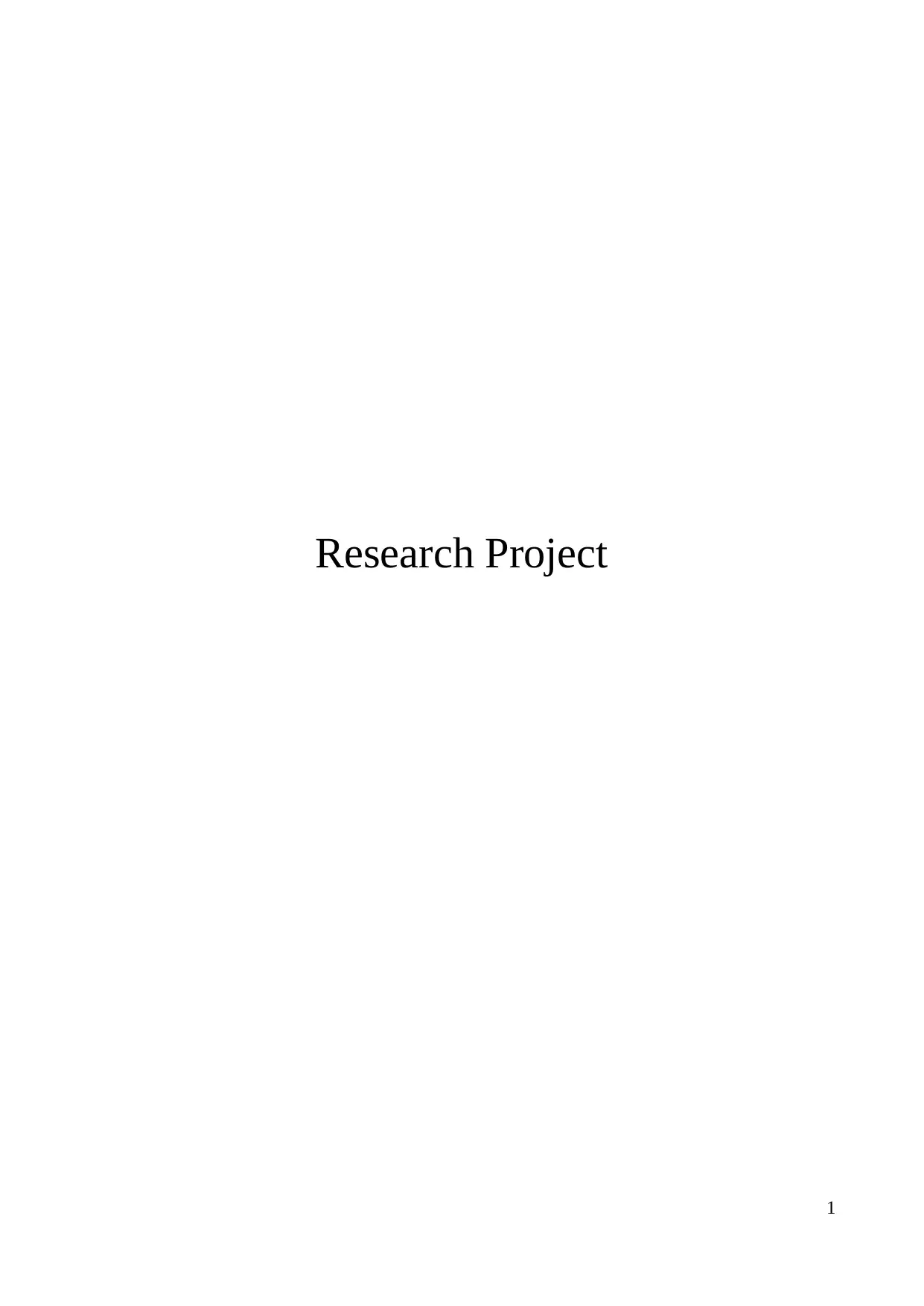
Research Project
1
1
Paraphrase This Document
Need a fresh take? Get an instant paraphrase of this document with our AI Paraphraser
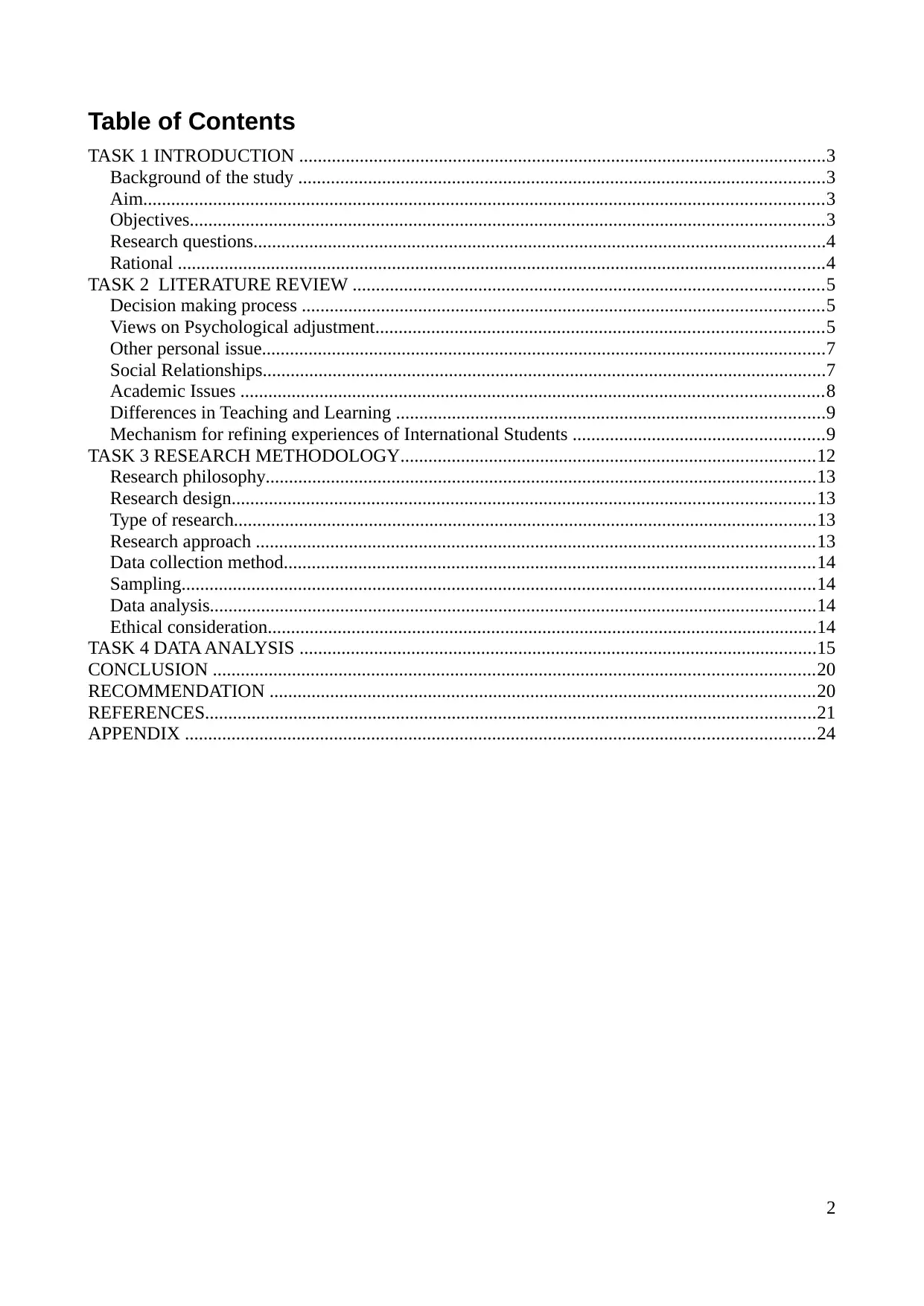
Table of Contents
TASK 1 INTRODUCTION .................................................................................................................3
Background of the study .................................................................................................................3
Aim..................................................................................................................................................3
Objectives........................................................................................................................................3
Research questions...........................................................................................................................4
Rational ...........................................................................................................................................4
TASK 2 LITERATURE REVIEW .....................................................................................................5
Decision making process ................................................................................................................5
Views on Psychological adjustment................................................................................................5
Other personal issue.........................................................................................................................7
Social Relationships.........................................................................................................................7
Academic Issues .............................................................................................................................8
Differences in Teaching and Learning ............................................................................................9
Mechanism for refining experiences of International Students ......................................................9
TASK 3 RESEARCH METHODOLOGY.........................................................................................12
Research philosophy......................................................................................................................13
Research design.............................................................................................................................13
Type of research.............................................................................................................................13
Research approach ........................................................................................................................13
Data collection method..................................................................................................................14
Sampling........................................................................................................................................14
Data analysis..................................................................................................................................14
Ethical consideration......................................................................................................................14
TASK 4 DATA ANALYSIS ...............................................................................................................15
CONCLUSION .................................................................................................................................20
RECOMMENDATION .....................................................................................................................20
REFERENCES...................................................................................................................................21
APPENDIX .......................................................................................................................................24
2
TASK 1 INTRODUCTION .................................................................................................................3
Background of the study .................................................................................................................3
Aim..................................................................................................................................................3
Objectives........................................................................................................................................3
Research questions...........................................................................................................................4
Rational ...........................................................................................................................................4
TASK 2 LITERATURE REVIEW .....................................................................................................5
Decision making process ................................................................................................................5
Views on Psychological adjustment................................................................................................5
Other personal issue.........................................................................................................................7
Social Relationships.........................................................................................................................7
Academic Issues .............................................................................................................................8
Differences in Teaching and Learning ............................................................................................9
Mechanism for refining experiences of International Students ......................................................9
TASK 3 RESEARCH METHODOLOGY.........................................................................................12
Research philosophy......................................................................................................................13
Research design.............................................................................................................................13
Type of research.............................................................................................................................13
Research approach ........................................................................................................................13
Data collection method..................................................................................................................14
Sampling........................................................................................................................................14
Data analysis..................................................................................................................................14
Ethical consideration......................................................................................................................14
TASK 4 DATA ANALYSIS ...............................................................................................................15
CONCLUSION .................................................................................................................................20
RECOMMENDATION .....................................................................................................................20
REFERENCES...................................................................................................................................21
APPENDIX .......................................................................................................................................24
2
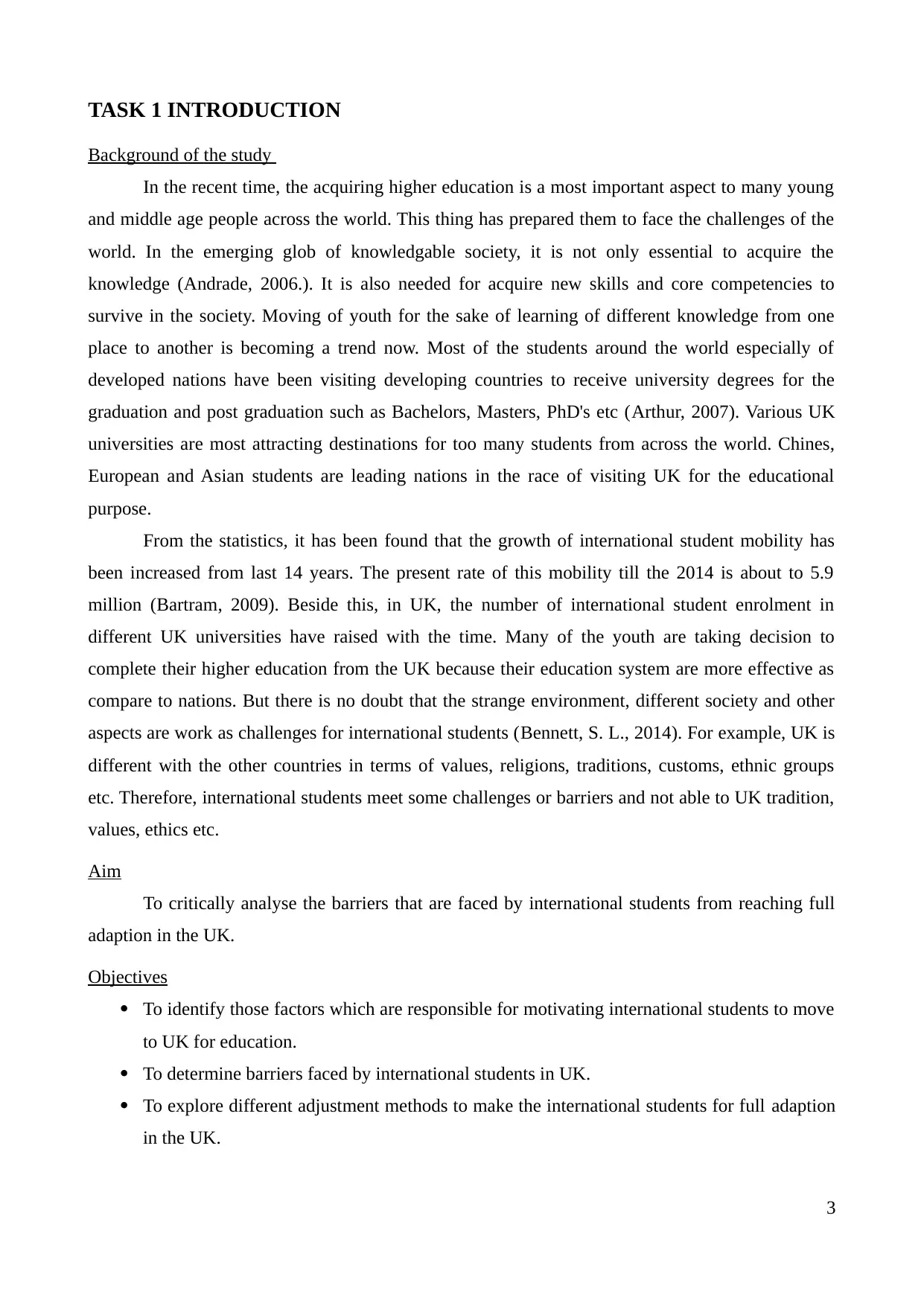
TASK 1 INTRODUCTION
Background of the study
In the recent time, the acquiring higher education is a most important aspect to many young
and middle age people across the world. This thing has prepared them to face the challenges of the
world. In the emerging glob of knowledgable society, it is not only essential to acquire the
knowledge (Andrade, 2006.). It is also needed for acquire new skills and core competencies to
survive in the society. Moving of youth for the sake of learning of different knowledge from one
place to another is becoming a trend now. Most of the students around the world especially of
developed nations have been visiting developing countries to receive university degrees for the
graduation and post graduation such as Bachelors, Masters, PhD's etc (Arthur, 2007). Various UK
universities are most attracting destinations for too many students from across the world. Chines,
European and Asian students are leading nations in the race of visiting UK for the educational
purpose.
From the statistics, it has been found that the growth of international student mobility has
been increased from last 14 years. The present rate of this mobility till the 2014 is about to 5.9
million (Bartram, 2009). Beside this, in UK, the number of international student enrolment in
different UK universities have raised with the time. Many of the youth are taking decision to
complete their higher education from the UK because their education system are more effective as
compare to nations. But there is no doubt that the strange environment, different society and other
aspects are work as challenges for international students (Bennett, S. L., 2014). For example, UK is
different with the other countries in terms of values, religions, traditions, customs, ethnic groups
etc. Therefore, international students meet some challenges or barriers and not able to UK tradition,
values, ethics etc.
Aim
To critically analyse the barriers that are faced by international students from reaching full
adaption in the UK.
Objectives
To identify those factors which are responsible for motivating international students to move
to UK for education.
To determine barriers faced by international students in UK.
To explore different adjustment methods to make the international students for full adaption
in the UK.
3
Background of the study
In the recent time, the acquiring higher education is a most important aspect to many young
and middle age people across the world. This thing has prepared them to face the challenges of the
world. In the emerging glob of knowledgable society, it is not only essential to acquire the
knowledge (Andrade, 2006.). It is also needed for acquire new skills and core competencies to
survive in the society. Moving of youth for the sake of learning of different knowledge from one
place to another is becoming a trend now. Most of the students around the world especially of
developed nations have been visiting developing countries to receive university degrees for the
graduation and post graduation such as Bachelors, Masters, PhD's etc (Arthur, 2007). Various UK
universities are most attracting destinations for too many students from across the world. Chines,
European and Asian students are leading nations in the race of visiting UK for the educational
purpose.
From the statistics, it has been found that the growth of international student mobility has
been increased from last 14 years. The present rate of this mobility till the 2014 is about to 5.9
million (Bartram, 2009). Beside this, in UK, the number of international student enrolment in
different UK universities have raised with the time. Many of the youth are taking decision to
complete their higher education from the UK because their education system are more effective as
compare to nations. But there is no doubt that the strange environment, different society and other
aspects are work as challenges for international students (Bennett, S. L., 2014). For example, UK is
different with the other countries in terms of values, religions, traditions, customs, ethnic groups
etc. Therefore, international students meet some challenges or barriers and not able to UK tradition,
values, ethics etc.
Aim
To critically analyse the barriers that are faced by international students from reaching full
adaption in the UK.
Objectives
To identify those factors which are responsible for motivating international students to move
to UK for education.
To determine barriers faced by international students in UK.
To explore different adjustment methods to make the international students for full adaption
in the UK.
3
⊘ This is a preview!⊘
Do you want full access?
Subscribe today to unlock all pages.

Trusted by 1+ million students worldwide
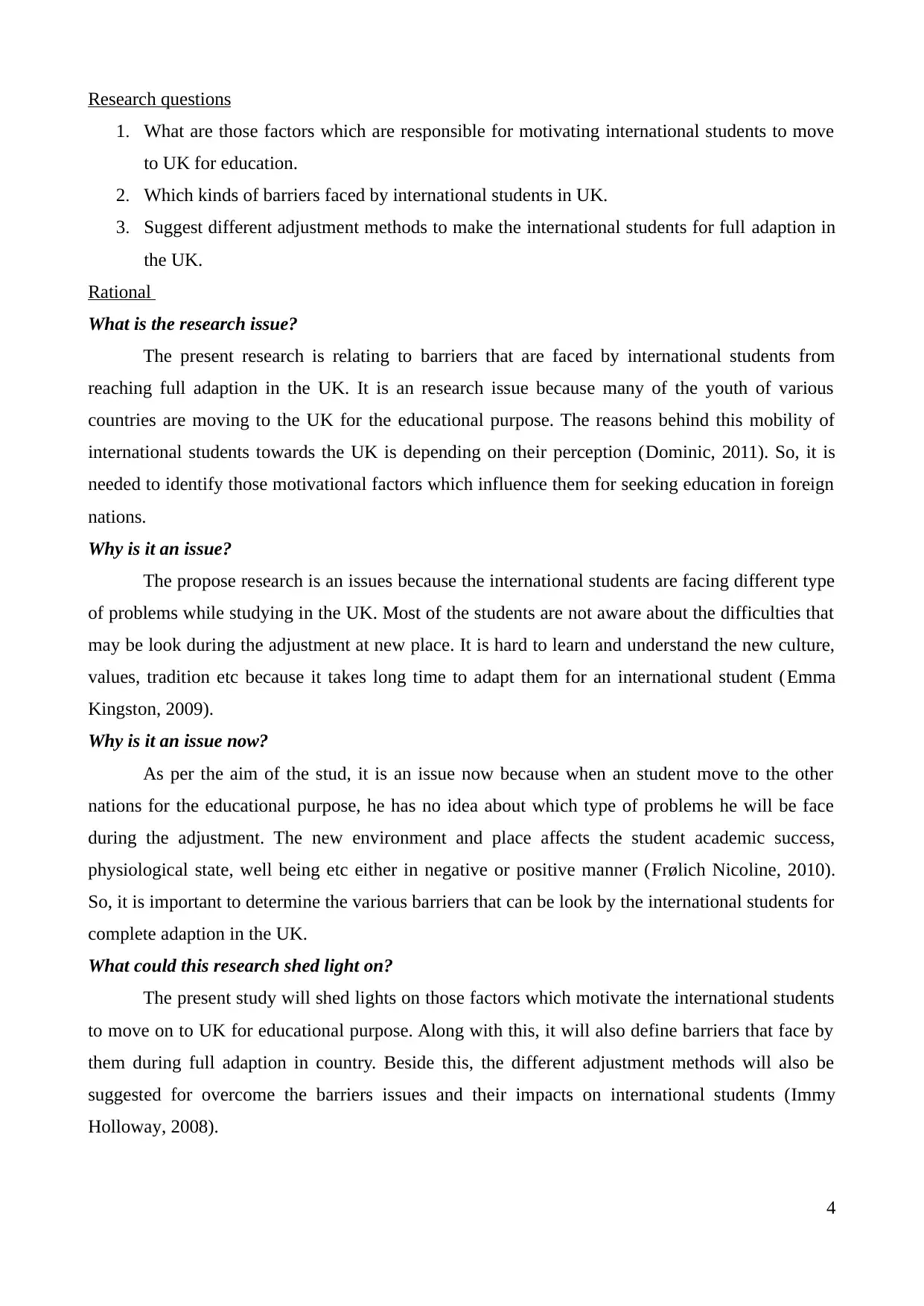
Research questions
1. What are those factors which are responsible for motivating international students to move
to UK for education.
2. Which kinds of barriers faced by international students in UK.
3. Suggest different adjustment methods to make the international students for full adaption in
the UK.
Rational
What is the research issue?
The present research is relating to barriers that are faced by international students from
reaching full adaption in the UK. It is an research issue because many of the youth of various
countries are moving to the UK for the educational purpose. The reasons behind this mobility of
international students towards the UK is depending on their perception (Dominic, 2011). So, it is
needed to identify those motivational factors which influence them for seeking education in foreign
nations.
Why is it an issue?
The propose research is an issues because the international students are facing different type
of problems while studying in the UK. Most of the students are not aware about the difficulties that
may be look during the adjustment at new place. It is hard to learn and understand the new culture,
values, tradition etc because it takes long time to adapt them for an international student (Emma
Kingston, 2009).
Why is it an issue now?
As per the aim of the stud, it is an issue now because when an student move to the other
nations for the educational purpose, he has no idea about which type of problems he will be face
during the adjustment. The new environment and place affects the student academic success,
physiological state, well being etc either in negative or positive manner (Frølich Nicoline, 2010).
So, it is important to determine the various barriers that can be look by the international students for
complete adaption in the UK.
What could this research shed light on?
The present study will shed lights on those factors which motivate the international students
to move on to UK for educational purpose. Along with this, it will also define barriers that face by
them during full adaption in country. Beside this, the different adjustment methods will also be
suggested for overcome the barriers issues and their impacts on international students (Immy
Holloway, 2008).
4
1. What are those factors which are responsible for motivating international students to move
to UK for education.
2. Which kinds of barriers faced by international students in UK.
3. Suggest different adjustment methods to make the international students for full adaption in
the UK.
Rational
What is the research issue?
The present research is relating to barriers that are faced by international students from
reaching full adaption in the UK. It is an research issue because many of the youth of various
countries are moving to the UK for the educational purpose. The reasons behind this mobility of
international students towards the UK is depending on their perception (Dominic, 2011). So, it is
needed to identify those motivational factors which influence them for seeking education in foreign
nations.
Why is it an issue?
The propose research is an issues because the international students are facing different type
of problems while studying in the UK. Most of the students are not aware about the difficulties that
may be look during the adjustment at new place. It is hard to learn and understand the new culture,
values, tradition etc because it takes long time to adapt them for an international student (Emma
Kingston, 2009).
Why is it an issue now?
As per the aim of the stud, it is an issue now because when an student move to the other
nations for the educational purpose, he has no idea about which type of problems he will be face
during the adjustment. The new environment and place affects the student academic success,
physiological state, well being etc either in negative or positive manner (Frølich Nicoline, 2010).
So, it is important to determine the various barriers that can be look by the international students for
complete adaption in the UK.
What could this research shed light on?
The present study will shed lights on those factors which motivate the international students
to move on to UK for educational purpose. Along with this, it will also define barriers that face by
them during full adaption in country. Beside this, the different adjustment methods will also be
suggested for overcome the barriers issues and their impacts on international students (Immy
Holloway, 2008).
4
Paraphrase This Document
Need a fresh take? Get an instant paraphrase of this document with our AI Paraphraser
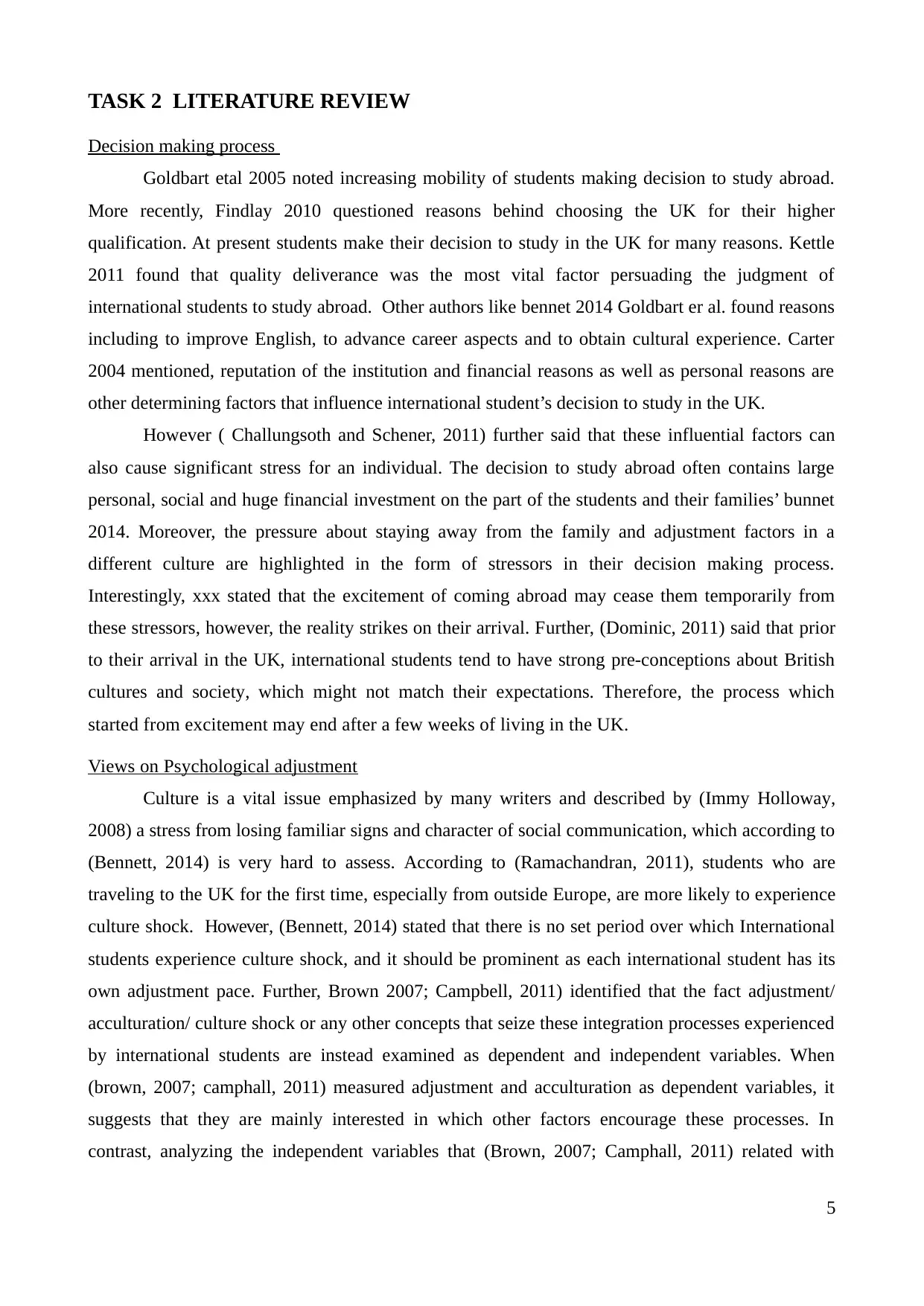
TASK 2 LITERATURE REVIEW
Decision making process
Goldbart etal 2005 noted increasing mobility of students making decision to study abroad.
More recently, Findlay 2010 questioned reasons behind choosing the UK for their higher
qualification. At present students make their decision to study in the UK for many reasons. Kettle
2011 found that quality deliverance was the most vital factor persuading the judgment of
international students to study abroad. Other authors like bennet 2014 Goldbart er al. found reasons
including to improve English, to advance career aspects and to obtain cultural experience. Carter
2004 mentioned, reputation of the institution and financial reasons as well as personal reasons are
other determining factors that influence international student’s decision to study in the UK.
However ( Challungsoth and Schener, 2011) further said that these influential factors can
also cause significant stress for an individual. The decision to study abroad often contains large
personal, social and huge financial investment on the part of the students and their families’ bunnet
2014. Moreover, the pressure about staying away from the family and adjustment factors in a
different culture are highlighted in the form of stressors in their decision making process.
Interestingly, xxx stated that the excitement of coming abroad may cease them temporarily from
these stressors, however, the reality strikes on their arrival. Further, (Dominic, 2011) said that prior
to their arrival in the UK, international students tend to have strong pre-conceptions about British
cultures and society, which might not match their expectations. Therefore, the process which
started from excitement may end after a few weeks of living in the UK.
Views on Psychological adjustment
Culture is a vital issue emphasized by many writers and described by (Immy Holloway,
2008) a stress from losing familiar signs and character of social communication, which according to
(Bennett, 2014) is very hard to assess. According to (Ramachandran, 2011), students who are
traveling to the UK for the first time, especially from outside Europe, are more likely to experience
culture shock. However, (Bennett, 2014) stated that there is no set period over which International
students experience culture shock, and it should be prominent as each international student has its
own adjustment pace. Further, Brown 2007; Campbell, 2011) identified that the fact adjustment/
acculturation/ culture shock or any other concepts that seize these integration processes experienced
by international students are instead examined as dependent and independent variables. When
(brown, 2007; camphall, 2011) measured adjustment and acculturation as dependent variables, it
suggests that they are mainly interested in which other factors encourage these processes. In
contrast, analyzing the independent variables that (Brown, 2007; Camphall, 2011) related with
5
Decision making process
Goldbart etal 2005 noted increasing mobility of students making decision to study abroad.
More recently, Findlay 2010 questioned reasons behind choosing the UK for their higher
qualification. At present students make their decision to study in the UK for many reasons. Kettle
2011 found that quality deliverance was the most vital factor persuading the judgment of
international students to study abroad. Other authors like bennet 2014 Goldbart er al. found reasons
including to improve English, to advance career aspects and to obtain cultural experience. Carter
2004 mentioned, reputation of the institution and financial reasons as well as personal reasons are
other determining factors that influence international student’s decision to study in the UK.
However ( Challungsoth and Schener, 2011) further said that these influential factors can
also cause significant stress for an individual. The decision to study abroad often contains large
personal, social and huge financial investment on the part of the students and their families’ bunnet
2014. Moreover, the pressure about staying away from the family and adjustment factors in a
different culture are highlighted in the form of stressors in their decision making process.
Interestingly, xxx stated that the excitement of coming abroad may cease them temporarily from
these stressors, however, the reality strikes on their arrival. Further, (Dominic, 2011) said that prior
to their arrival in the UK, international students tend to have strong pre-conceptions about British
cultures and society, which might not match their expectations. Therefore, the process which
started from excitement may end after a few weeks of living in the UK.
Views on Psychological adjustment
Culture is a vital issue emphasized by many writers and described by (Immy Holloway,
2008) a stress from losing familiar signs and character of social communication, which according to
(Bennett, 2014) is very hard to assess. According to (Ramachandran, 2011), students who are
traveling to the UK for the first time, especially from outside Europe, are more likely to experience
culture shock. However, (Bennett, 2014) stated that there is no set period over which International
students experience culture shock, and it should be prominent as each international student has its
own adjustment pace. Further, Brown 2007; Campbell, 2011) identified that the fact adjustment/
acculturation/ culture shock or any other concepts that seize these integration processes experienced
by international students are instead examined as dependent and independent variables. When
(brown, 2007; camphall, 2011) measured adjustment and acculturation as dependent variables, it
suggests that they are mainly interested in which other factors encourage these processes. In
contrast, analyzing the independent variables that (Brown, 2007; Camphall, 2011) related with
5
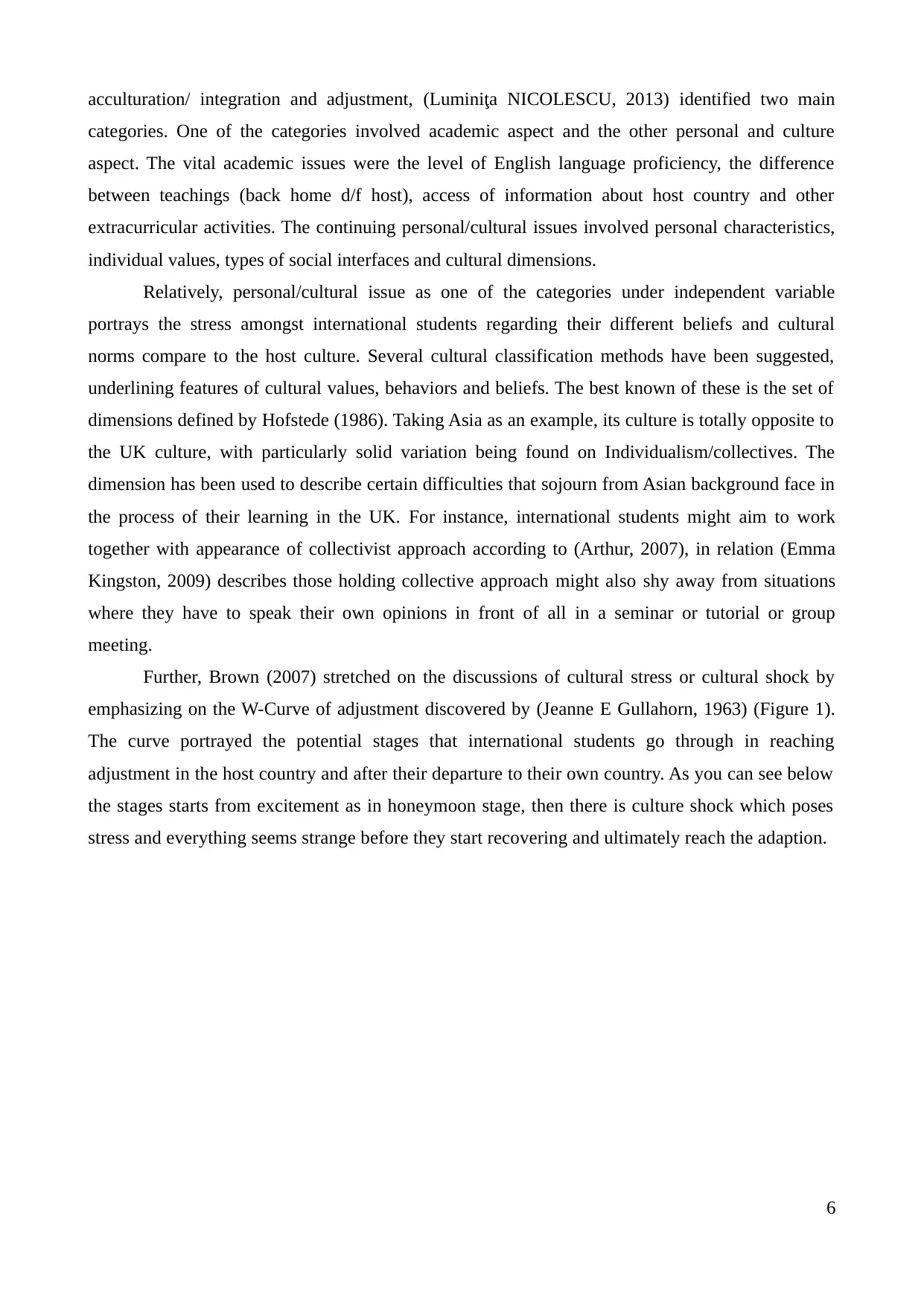
acculturation/ integration and adjustment, (Luminiţa NICOLESCU, 2013) identified two main
categories. One of the categories involved academic aspect and the other personal and culture
aspect. The vital academic issues were the level of English language proficiency, the difference
between teachings (back home d/f host), access of information about host country and other
extracurricular activities. The continuing personal/cultural issues involved personal characteristics,
individual values, types of social interfaces and cultural dimensions.
Relatively, personal/cultural issue as one of the categories under independent variable
portrays the stress amongst international students regarding their different beliefs and cultural
norms compare to the host culture. Several cultural classification methods have been suggested,
underlining features of cultural values, behaviors and beliefs. The best known of these is the set of
dimensions defined by Hofstede (1986). Taking Asia as an example, its culture is totally opposite to
the UK culture, with particularly solid variation being found on Individualism/collectives. The
dimension has been used to describe certain difficulties that sojourn from Asian background face in
the process of their learning in the UK. For instance, international students might aim to work
together with appearance of collectivist approach according to (Arthur, 2007), in relation (Emma
Kingston, 2009) describes those holding collective approach might also shy away from situations
where they have to speak their own opinions in front of all in a seminar or tutorial or group
meeting.
Further, Brown (2007) stretched on the discussions of cultural stress or cultural shock by
emphasizing on the W-Curve of adjustment discovered by (Jeanne E Gullahorn, 1963) (Figure 1).
The curve portrayed the potential stages that international students go through in reaching
adjustment in the host country and after their departure to their own country. As you can see below
the stages starts from excitement as in honeymoon stage, then there is culture shock which poses
stress and everything seems strange before they start recovering and ultimately reach the adaption.
6
categories. One of the categories involved academic aspect and the other personal and culture
aspect. The vital academic issues were the level of English language proficiency, the difference
between teachings (back home d/f host), access of information about host country and other
extracurricular activities. The continuing personal/cultural issues involved personal characteristics,
individual values, types of social interfaces and cultural dimensions.
Relatively, personal/cultural issue as one of the categories under independent variable
portrays the stress amongst international students regarding their different beliefs and cultural
norms compare to the host culture. Several cultural classification methods have been suggested,
underlining features of cultural values, behaviors and beliefs. The best known of these is the set of
dimensions defined by Hofstede (1986). Taking Asia as an example, its culture is totally opposite to
the UK culture, with particularly solid variation being found on Individualism/collectives. The
dimension has been used to describe certain difficulties that sojourn from Asian background face in
the process of their learning in the UK. For instance, international students might aim to work
together with appearance of collectivist approach according to (Arthur, 2007), in relation (Emma
Kingston, 2009) describes those holding collective approach might also shy away from situations
where they have to speak their own opinions in front of all in a seminar or tutorial or group
meeting.
Further, Brown (2007) stretched on the discussions of cultural stress or cultural shock by
emphasizing on the W-Curve of adjustment discovered by (Jeanne E Gullahorn, 1963) (Figure 1).
The curve portrayed the potential stages that international students go through in reaching
adjustment in the host country and after their departure to their own country. As you can see below
the stages starts from excitement as in honeymoon stage, then there is culture shock which poses
stress and everything seems strange before they start recovering and ultimately reach the adaption.
6
⊘ This is a preview!⊘
Do you want full access?
Subscribe today to unlock all pages.

Trusted by 1+ million students worldwide
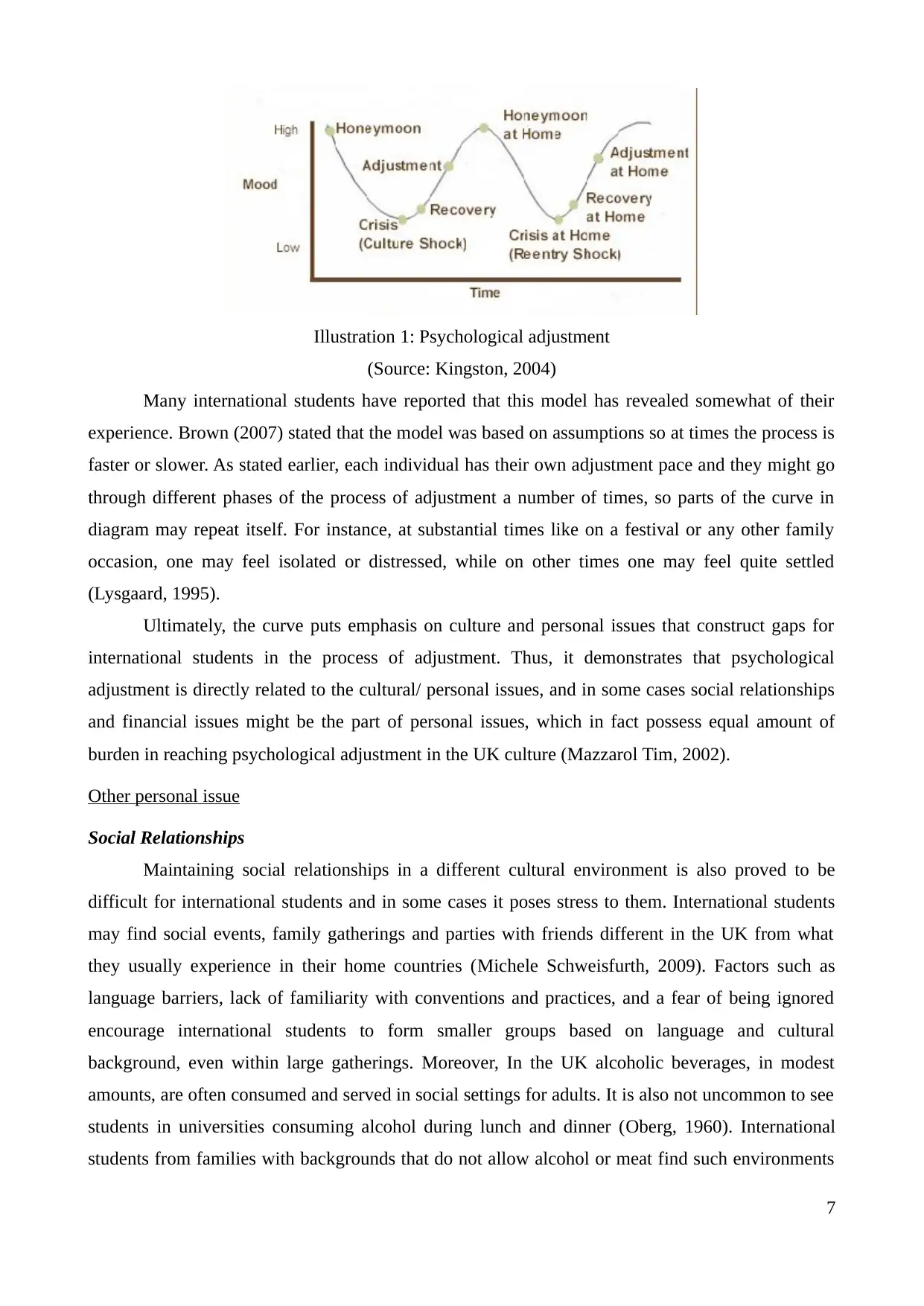
Illustration 1: Psychological adjustment
(Source: Kingston, 2004)
Many international students have reported that this model has revealed somewhat of their
experience. Brown (2007) stated that the model was based on assumptions so at times the process is
faster or slower. As stated earlier, each individual has their own adjustment pace and they might go
through different phases of the process of adjustment a number of times, so parts of the curve in
diagram may repeat itself. For instance, at substantial times like on a festival or any other family
occasion, one may feel isolated or distressed, while on other times one may feel quite settled
(Lysgaard, 1995).
Ultimately, the curve puts emphasis on culture and personal issues that construct gaps for
international students in the process of adjustment. Thus, it demonstrates that psychological
adjustment is directly related to the cultural/ personal issues, and in some cases social relationships
and financial issues might be the part of personal issues, which in fact possess equal amount of
burden in reaching psychological adjustment in the UK culture (Mazzarol Tim, 2002).
Other personal issue
Social Relationships
Maintaining social relationships in a different cultural environment is also proved to be
difficult for international students and in some cases it poses stress to them. International students
may find social events, family gatherings and parties with friends different in the UK from what
they usually experience in their home countries (Michele Schweisfurth, 2009). Factors such as
language barriers, lack of familiarity with conventions and practices, and a fear of being ignored
encourage international students to form smaller groups based on language and cultural
background, even within large gatherings. Moreover, In the UK alcoholic beverages, in modest
amounts, are often consumed and served in social settings for adults. It is also not uncommon to see
students in universities consuming alcohol during lunch and dinner (Oberg, 1960). International
students from families with backgrounds that do not allow alcohol or meat find such environments
7
(Source: Kingston, 2004)
Many international students have reported that this model has revealed somewhat of their
experience. Brown (2007) stated that the model was based on assumptions so at times the process is
faster or slower. As stated earlier, each individual has their own adjustment pace and they might go
through different phases of the process of adjustment a number of times, so parts of the curve in
diagram may repeat itself. For instance, at substantial times like on a festival or any other family
occasion, one may feel isolated or distressed, while on other times one may feel quite settled
(Lysgaard, 1995).
Ultimately, the curve puts emphasis on culture and personal issues that construct gaps for
international students in the process of adjustment. Thus, it demonstrates that psychological
adjustment is directly related to the cultural/ personal issues, and in some cases social relationships
and financial issues might be the part of personal issues, which in fact possess equal amount of
burden in reaching psychological adjustment in the UK culture (Mazzarol Tim, 2002).
Other personal issue
Social Relationships
Maintaining social relationships in a different cultural environment is also proved to be
difficult for international students and in some cases it poses stress to them. International students
may find social events, family gatherings and parties with friends different in the UK from what
they usually experience in their home countries (Michele Schweisfurth, 2009). Factors such as
language barriers, lack of familiarity with conventions and practices, and a fear of being ignored
encourage international students to form smaller groups based on language and cultural
background, even within large gatherings. Moreover, In the UK alcoholic beverages, in modest
amounts, are often consumed and served in social settings for adults. It is also not uncommon to see
students in universities consuming alcohol during lunch and dinner (Oberg, 1960). International
students from families with backgrounds that do not allow alcohol or meat find such environments
7
Paraphrase This Document
Need a fresh take? Get an instant paraphrase of this document with our AI Paraphraser
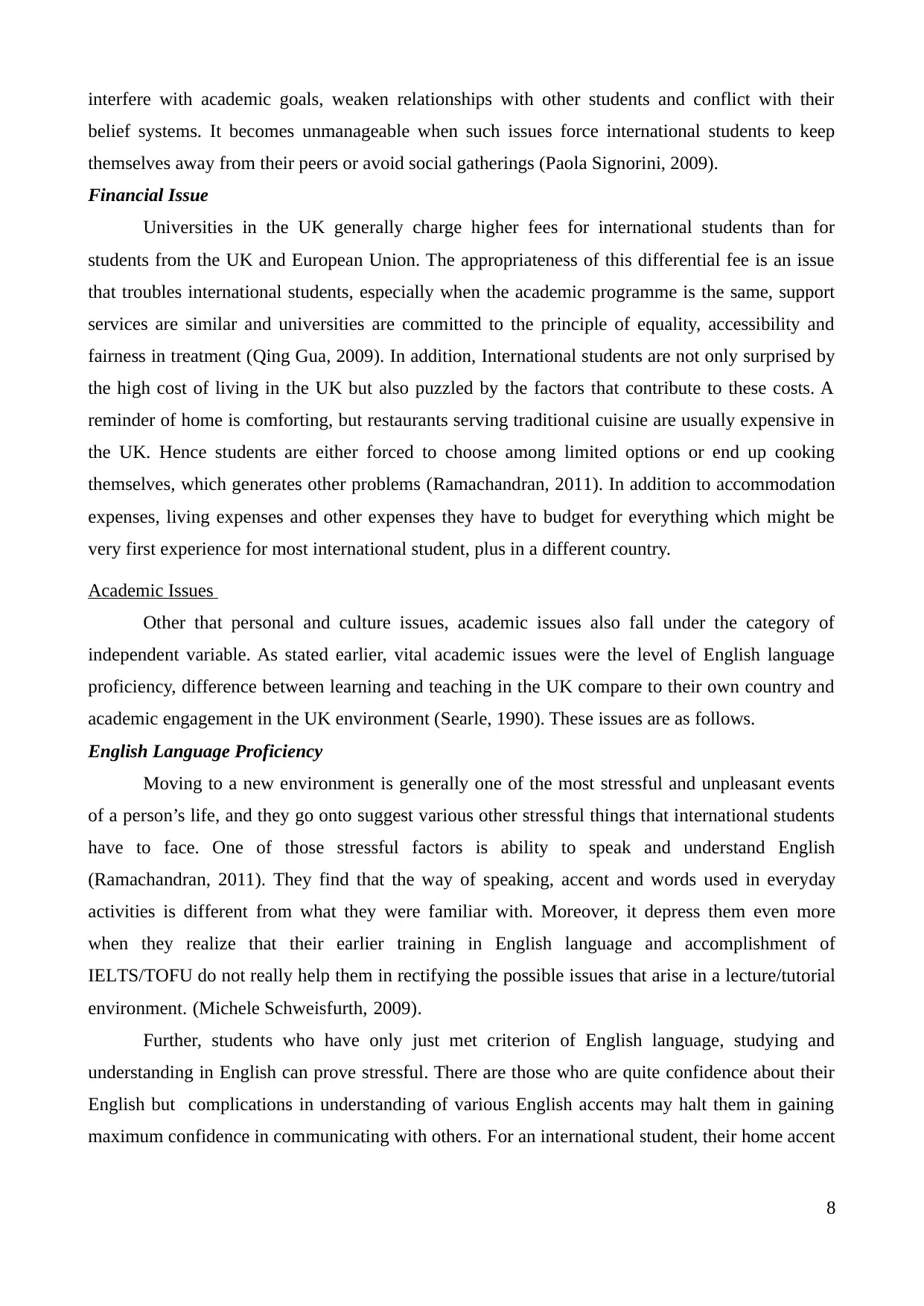
interfere with academic goals, weaken relationships with other students and conflict with their
belief systems. It becomes unmanageable when such issues force international students to keep
themselves away from their peers or avoid social gatherings (Paola Signorini, 2009).
Financial Issue
Universities in the UK generally charge higher fees for international students than for
students from the UK and European Union. The appropriateness of this differential fee is an issue
that troubles international students, especially when the academic programme is the same, support
services are similar and universities are committed to the principle of equality, accessibility and
fairness in treatment (Qing Gua, 2009). In addition, International students are not only surprised by
the high cost of living in the UK but also puzzled by the factors that contribute to these costs. A
reminder of home is comforting, but restaurants serving traditional cuisine are usually expensive in
the UK. Hence students are either forced to choose among limited options or end up cooking
themselves, which generates other problems (Ramachandran, 2011). In addition to accommodation
expenses, living expenses and other expenses they have to budget for everything which might be
very first experience for most international student, plus in a different country.
Academic Issues
Other that personal and culture issues, academic issues also fall under the category of
independent variable. As stated earlier, vital academic issues were the level of English language
proficiency, difference between learning and teaching in the UK compare to their own country and
academic engagement in the UK environment (Searle, 1990). These issues are as follows.
English Language Proficiency
Moving to a new environment is generally one of the most stressful and unpleasant events
of a person’s life, and they go onto suggest various other stressful things that international students
have to face. One of those stressful factors is ability to speak and understand English
(Ramachandran, 2011). They find that the way of speaking, accent and words used in everyday
activities is different from what they were familiar with. Moreover, it depress them even more
when they realize that their earlier training in English language and accomplishment of
IELTS/TOFU do not really help them in rectifying the possible issues that arise in a lecture/tutorial
environment. (Michele Schweisfurth, 2009).
Further, students who have only just met criterion of English language, studying and
understanding in English can prove stressful. There are those who are quite confidence about their
English but complications in understanding of various English accents may halt them in gaining
maximum confidence in communicating with others. For an international student, their home accent
8
belief systems. It becomes unmanageable when such issues force international students to keep
themselves away from their peers or avoid social gatherings (Paola Signorini, 2009).
Financial Issue
Universities in the UK generally charge higher fees for international students than for
students from the UK and European Union. The appropriateness of this differential fee is an issue
that troubles international students, especially when the academic programme is the same, support
services are similar and universities are committed to the principle of equality, accessibility and
fairness in treatment (Qing Gua, 2009). In addition, International students are not only surprised by
the high cost of living in the UK but also puzzled by the factors that contribute to these costs. A
reminder of home is comforting, but restaurants serving traditional cuisine are usually expensive in
the UK. Hence students are either forced to choose among limited options or end up cooking
themselves, which generates other problems (Ramachandran, 2011). In addition to accommodation
expenses, living expenses and other expenses they have to budget for everything which might be
very first experience for most international student, plus in a different country.
Academic Issues
Other that personal and culture issues, academic issues also fall under the category of
independent variable. As stated earlier, vital academic issues were the level of English language
proficiency, difference between learning and teaching in the UK compare to their own country and
academic engagement in the UK environment (Searle, 1990). These issues are as follows.
English Language Proficiency
Moving to a new environment is generally one of the most stressful and unpleasant events
of a person’s life, and they go onto suggest various other stressful things that international students
have to face. One of those stressful factors is ability to speak and understand English
(Ramachandran, 2011). They find that the way of speaking, accent and words used in everyday
activities is different from what they were familiar with. Moreover, it depress them even more
when they realize that their earlier training in English language and accomplishment of
IELTS/TOFU do not really help them in rectifying the possible issues that arise in a lecture/tutorial
environment. (Michele Schweisfurth, 2009).
Further, students who have only just met criterion of English language, studying and
understanding in English can prove stressful. There are those who are quite confidence about their
English but complications in understanding of various English accents may halt them in gaining
maximum confidence in communicating with others. For an international student, their home accent
8
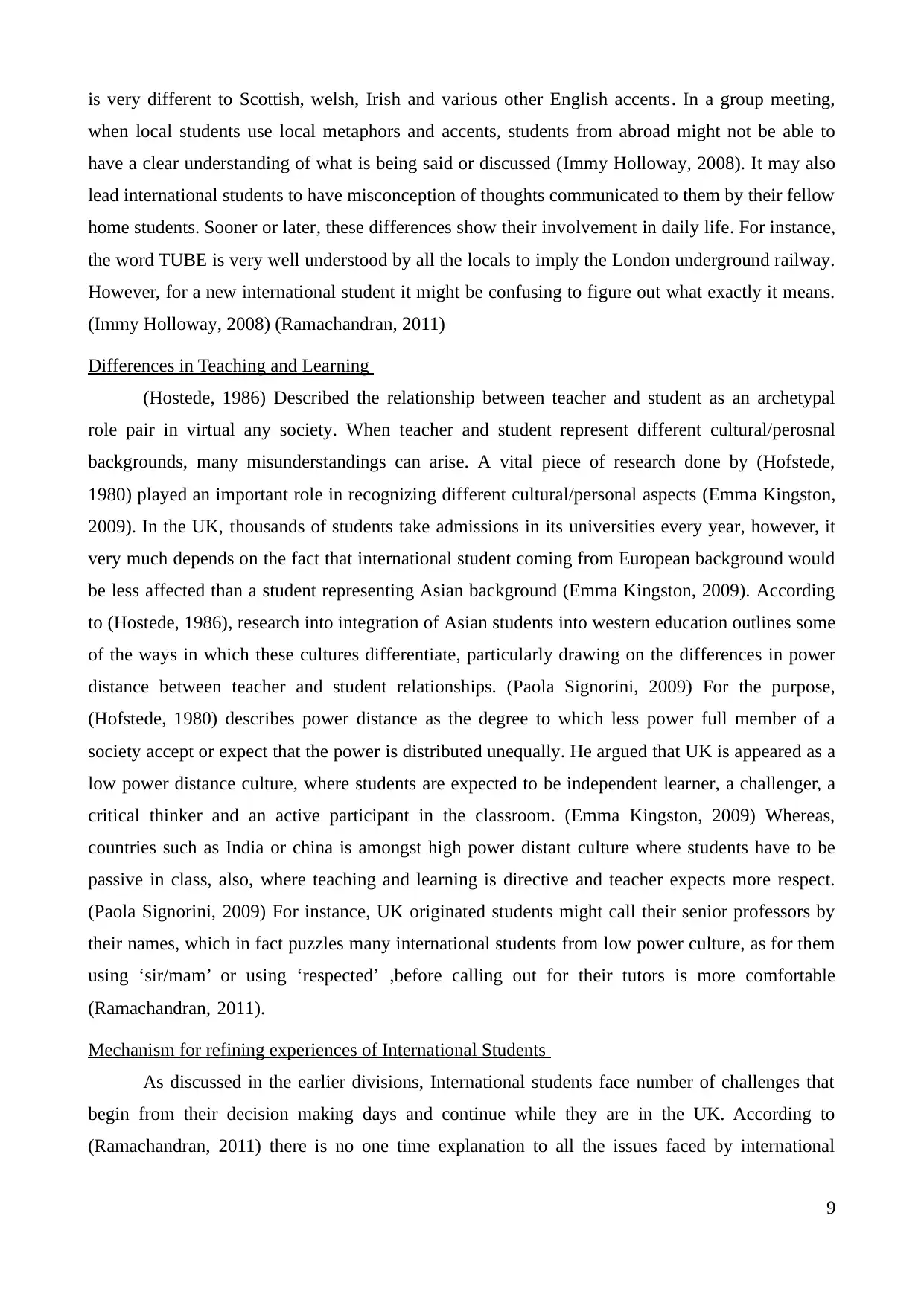
is very different to Scottish, welsh, Irish and various other English accents. In a group meeting,
when local students use local metaphors and accents, students from abroad might not be able to
have a clear understanding of what is being said or discussed (Immy Holloway, 2008). It may also
lead international students to have misconception of thoughts communicated to them by their fellow
home students. Sooner or later, these differences show their involvement in daily life. For instance,
the word TUBE is very well understood by all the locals to imply the London underground railway.
However, for a new international student it might be confusing to figure out what exactly it means.
(Immy Holloway, 2008) (Ramachandran, 2011)
Differences in Teaching and Learning
(Hostede, 1986) Described the relationship between teacher and student as an archetypal
role pair in virtual any society. When teacher and student represent different cultural/perosnal
backgrounds, many misunderstandings can arise. A vital piece of research done by (Hofstede,
1980) played an important role in recognizing different cultural/personal aspects (Emma Kingston,
2009). In the UK, thousands of students take admissions in its universities every year, however, it
very much depends on the fact that international student coming from European background would
be less affected than a student representing Asian background (Emma Kingston, 2009). According
to (Hostede, 1986), research into integration of Asian students into western education outlines some
of the ways in which these cultures differentiate, particularly drawing on the differences in power
distance between teacher and student relationships. (Paola Signorini, 2009) For the purpose,
(Hofstede, 1980) describes power distance as the degree to which less power full member of a
society accept or expect that the power is distributed unequally. He argued that UK is appeared as a
low power distance culture, where students are expected to be independent learner, a challenger, a
critical thinker and an active participant in the classroom. (Emma Kingston, 2009) Whereas,
countries such as India or china is amongst high power distant culture where students have to be
passive in class, also, where teaching and learning is directive and teacher expects more respect.
(Paola Signorini, 2009) For instance, UK originated students might call their senior professors by
their names, which in fact puzzles many international students from low power culture, as for them
using ‘sir/mam’ or using ‘respected’ ,before calling out for their tutors is more comfortable
(Ramachandran, 2011).
Mechanism for refining experiences of International Students
As discussed in the earlier divisions, International students face number of challenges that
begin from their decision making days and continue while they are in the UK. According to
(Ramachandran, 2011) there is no one time explanation to all the issues faced by international
9
when local students use local metaphors and accents, students from abroad might not be able to
have a clear understanding of what is being said or discussed (Immy Holloway, 2008). It may also
lead international students to have misconception of thoughts communicated to them by their fellow
home students. Sooner or later, these differences show their involvement in daily life. For instance,
the word TUBE is very well understood by all the locals to imply the London underground railway.
However, for a new international student it might be confusing to figure out what exactly it means.
(Immy Holloway, 2008) (Ramachandran, 2011)
Differences in Teaching and Learning
(Hostede, 1986) Described the relationship between teacher and student as an archetypal
role pair in virtual any society. When teacher and student represent different cultural/perosnal
backgrounds, many misunderstandings can arise. A vital piece of research done by (Hofstede,
1980) played an important role in recognizing different cultural/personal aspects (Emma Kingston,
2009). In the UK, thousands of students take admissions in its universities every year, however, it
very much depends on the fact that international student coming from European background would
be less affected than a student representing Asian background (Emma Kingston, 2009). According
to (Hostede, 1986), research into integration of Asian students into western education outlines some
of the ways in which these cultures differentiate, particularly drawing on the differences in power
distance between teacher and student relationships. (Paola Signorini, 2009) For the purpose,
(Hofstede, 1980) describes power distance as the degree to which less power full member of a
society accept or expect that the power is distributed unequally. He argued that UK is appeared as a
low power distance culture, where students are expected to be independent learner, a challenger, a
critical thinker and an active participant in the classroom. (Emma Kingston, 2009) Whereas,
countries such as India or china is amongst high power distant culture where students have to be
passive in class, also, where teaching and learning is directive and teacher expects more respect.
(Paola Signorini, 2009) For instance, UK originated students might call their senior professors by
their names, which in fact puzzles many international students from low power culture, as for them
using ‘sir/mam’ or using ‘respected’ ,before calling out for their tutors is more comfortable
(Ramachandran, 2011).
Mechanism for refining experiences of International Students
As discussed in the earlier divisions, International students face number of challenges that
begin from their decision making days and continue while they are in the UK. According to
(Ramachandran, 2011) there is no one time explanation to all the issues faced by international
9
⊘ This is a preview!⊘
Do you want full access?
Subscribe today to unlock all pages.

Trusted by 1+ million students worldwide
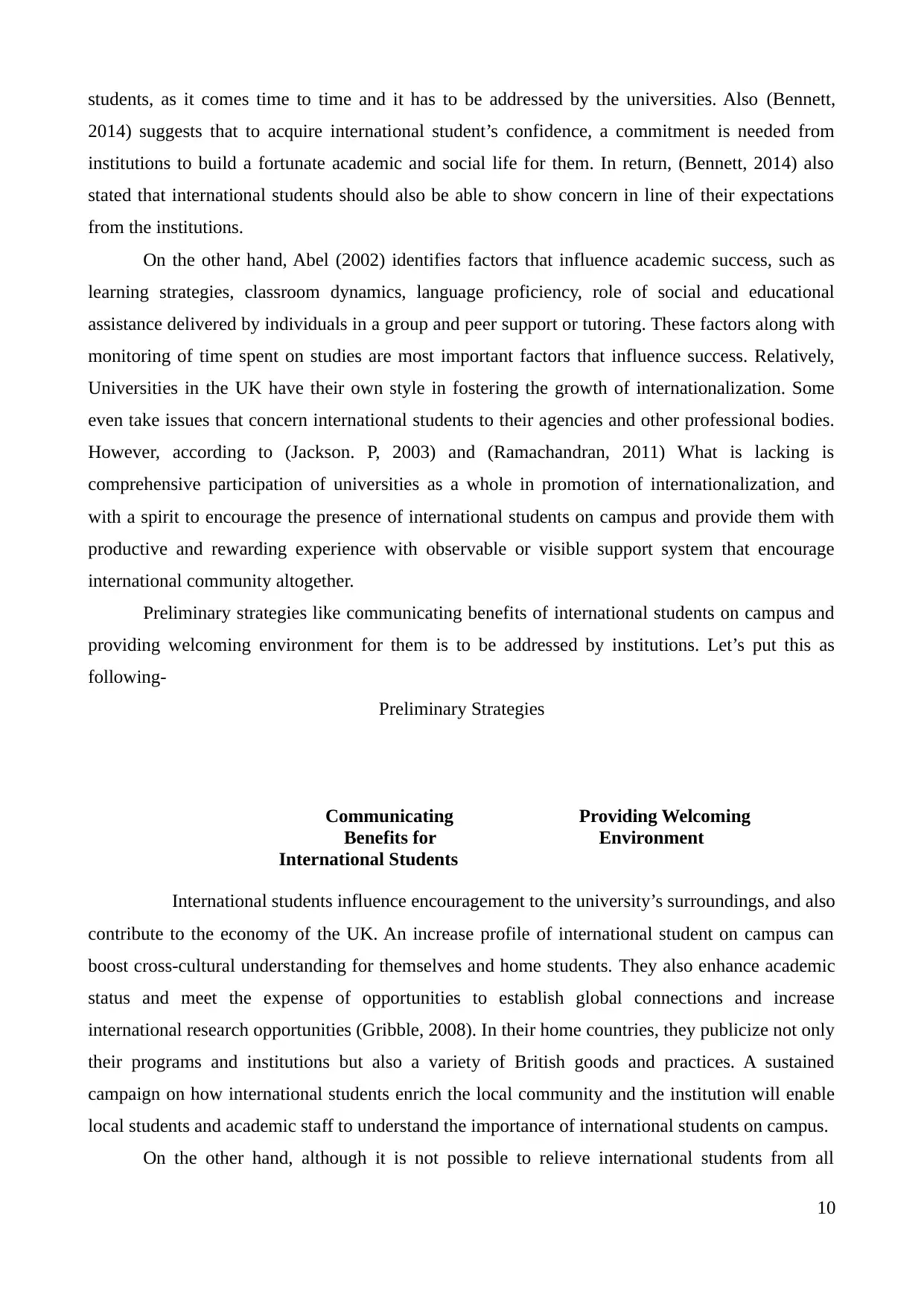
students, as it comes time to time and it has to be addressed by the universities. Also (Bennett,
2014) suggests that to acquire international student’s confidence, a commitment is needed from
institutions to build a fortunate academic and social life for them. In return, (Bennett, 2014) also
stated that international students should also be able to show concern in line of their expectations
from the institutions.
On the other hand, Abel (2002) identifies factors that influence academic success, such as
learning strategies, classroom dynamics, language proficiency, role of social and educational
assistance delivered by individuals in a group and peer support or tutoring. These factors along with
monitoring of time spent on studies are most important factors that influence success. Relatively,
Universities in the UK have their own style in fostering the growth of internationalization. Some
even take issues that concern international students to their agencies and other professional bodies.
However, according to (Jackson. P, 2003) and (Ramachandran, 2011) What is lacking is
comprehensive participation of universities as a whole in promotion of internationalization, and
with a spirit to encourage the presence of international students on campus and provide them with
productive and rewarding experience with observable or visible support system that encourage
international community altogether.
Preliminary strategies like communicating benefits of international students on campus and
providing welcoming environment for them is to be addressed by institutions. Let’s put this as
following-
Preliminary Strategies
Communicating Providing Welcoming
Benefits for Environment
International Students
International students influence encouragement to the university’s surroundings, and also
contribute to the economy of the UK. An increase profile of international student on campus can
boost cross-cultural understanding for themselves and home students. They also enhance academic
status and meet the expense of opportunities to establish global connections and increase
international research opportunities (Gribble, 2008). In their home countries, they publicize not only
their programs and institutions but also a variety of British goods and practices. A sustained
campaign on how international students enrich the local community and the institution will enable
local students and academic staff to understand the importance of international students on campus.
On the other hand, although it is not possible to relieve international students from all
10
2014) suggests that to acquire international student’s confidence, a commitment is needed from
institutions to build a fortunate academic and social life for them. In return, (Bennett, 2014) also
stated that international students should also be able to show concern in line of their expectations
from the institutions.
On the other hand, Abel (2002) identifies factors that influence academic success, such as
learning strategies, classroom dynamics, language proficiency, role of social and educational
assistance delivered by individuals in a group and peer support or tutoring. These factors along with
monitoring of time spent on studies are most important factors that influence success. Relatively,
Universities in the UK have their own style in fostering the growth of internationalization. Some
even take issues that concern international students to their agencies and other professional bodies.
However, according to (Jackson. P, 2003) and (Ramachandran, 2011) What is lacking is
comprehensive participation of universities as a whole in promotion of internationalization, and
with a spirit to encourage the presence of international students on campus and provide them with
productive and rewarding experience with observable or visible support system that encourage
international community altogether.
Preliminary strategies like communicating benefits of international students on campus and
providing welcoming environment for them is to be addressed by institutions. Let’s put this as
following-
Preliminary Strategies
Communicating Providing Welcoming
Benefits for Environment
International Students
International students influence encouragement to the university’s surroundings, and also
contribute to the economy of the UK. An increase profile of international student on campus can
boost cross-cultural understanding for themselves and home students. They also enhance academic
status and meet the expense of opportunities to establish global connections and increase
international research opportunities (Gribble, 2008). In their home countries, they publicize not only
their programs and institutions but also a variety of British goods and practices. A sustained
campaign on how international students enrich the local community and the institution will enable
local students and academic staff to understand the importance of international students on campus.
On the other hand, although it is not possible to relieve international students from all
10
Paraphrase This Document
Need a fresh take? Get an instant paraphrase of this document with our AI Paraphraser
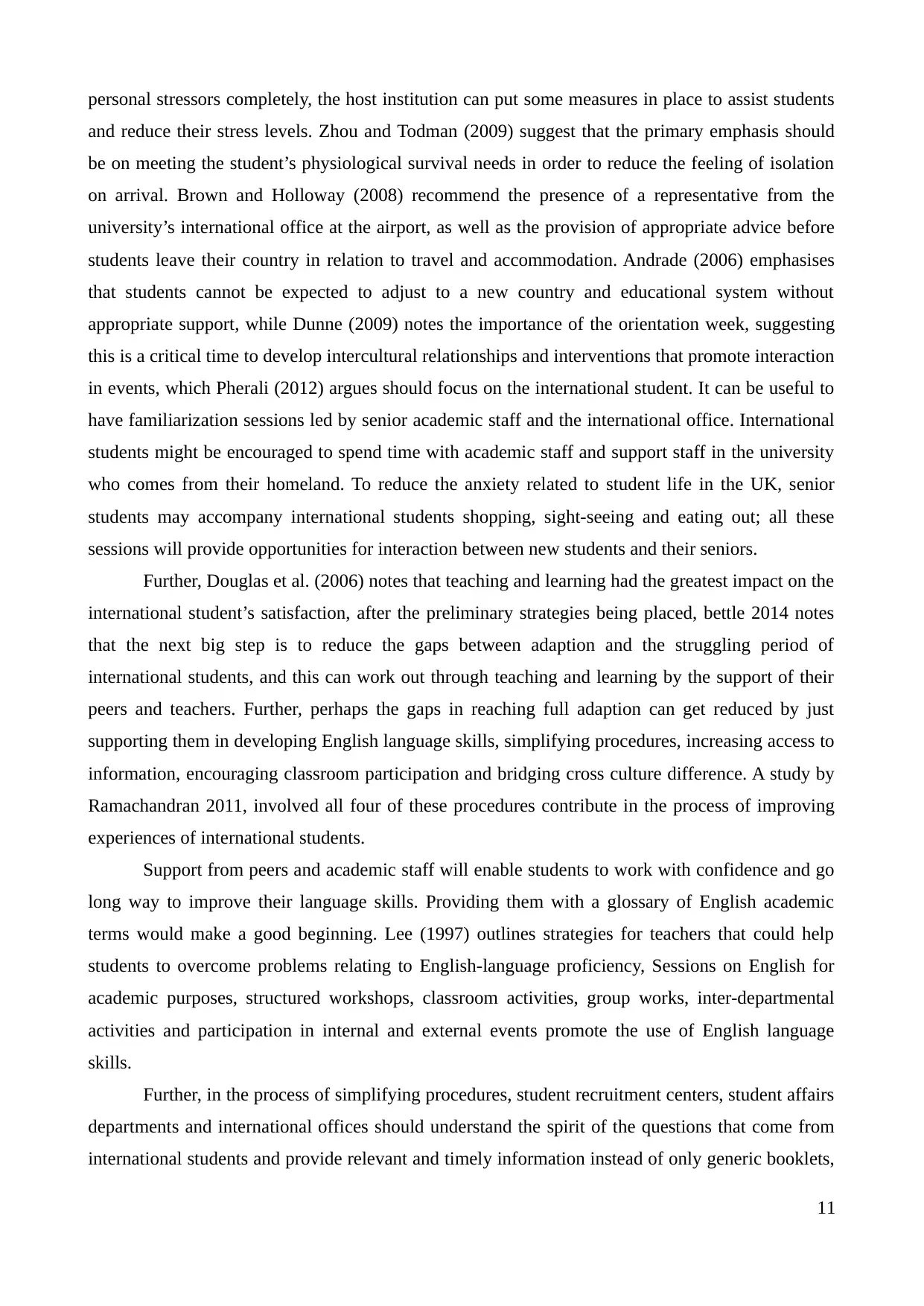
personal stressors completely, the host institution can put some measures in place to assist students
and reduce their stress levels. Zhou and Todman (2009) suggest that the primary emphasis should
be on meeting the student’s physiological survival needs in order to reduce the feeling of isolation
on arrival. Brown and Holloway (2008) recommend the presence of a representative from the
university’s international office at the airport, as well as the provision of appropriate advice before
students leave their country in relation to travel and accommodation. Andrade (2006) emphasises
that students cannot be expected to adjust to a new country and educational system without
appropriate support, while Dunne (2009) notes the importance of the orientation week, suggesting
this is a critical time to develop intercultural relationships and interventions that promote interaction
in events, which Pherali (2012) argues should focus on the international student. It can be useful to
have familiarization sessions led by senior academic staff and the international office. International
students might be encouraged to spend time with academic staff and support staff in the university
who comes from their homeland. To reduce the anxiety related to student life in the UK, senior
students may accompany international students shopping, sight-seeing and eating out; all these
sessions will provide opportunities for interaction between new students and their seniors.
Further, Douglas et al. (2006) notes that teaching and learning had the greatest impact on the
international student’s satisfaction, after the preliminary strategies being placed, bettle 2014 notes
that the next big step is to reduce the gaps between adaption and the struggling period of
international students, and this can work out through teaching and learning by the support of their
peers and teachers. Further, perhaps the gaps in reaching full adaption can get reduced by just
supporting them in developing English language skills, simplifying procedures, increasing access to
information, encouraging classroom participation and bridging cross culture difference. A study by
Ramachandran 2011, involved all four of these procedures contribute in the process of improving
experiences of international students.
Support from peers and academic staff will enable students to work with confidence and go
long way to improve their language skills. Providing them with a glossary of English academic
terms would make a good beginning. Lee (1997) outlines strategies for teachers that could help
students to overcome problems relating to English-language proficiency, Sessions on English for
academic purposes, structured workshops, classroom activities, group works, inter-departmental
activities and participation in internal and external events promote the use of English language
skills.
Further, in the process of simplifying procedures, student recruitment centers, student affairs
departments and international offices should understand the spirit of the questions that come from
international students and provide relevant and timely information instead of only generic booklets,
11
and reduce their stress levels. Zhou and Todman (2009) suggest that the primary emphasis should
be on meeting the student’s physiological survival needs in order to reduce the feeling of isolation
on arrival. Brown and Holloway (2008) recommend the presence of a representative from the
university’s international office at the airport, as well as the provision of appropriate advice before
students leave their country in relation to travel and accommodation. Andrade (2006) emphasises
that students cannot be expected to adjust to a new country and educational system without
appropriate support, while Dunne (2009) notes the importance of the orientation week, suggesting
this is a critical time to develop intercultural relationships and interventions that promote interaction
in events, which Pherali (2012) argues should focus on the international student. It can be useful to
have familiarization sessions led by senior academic staff and the international office. International
students might be encouraged to spend time with academic staff and support staff in the university
who comes from their homeland. To reduce the anxiety related to student life in the UK, senior
students may accompany international students shopping, sight-seeing and eating out; all these
sessions will provide opportunities for interaction between new students and their seniors.
Further, Douglas et al. (2006) notes that teaching and learning had the greatest impact on the
international student’s satisfaction, after the preliminary strategies being placed, bettle 2014 notes
that the next big step is to reduce the gaps between adaption and the struggling period of
international students, and this can work out through teaching and learning by the support of their
peers and teachers. Further, perhaps the gaps in reaching full adaption can get reduced by just
supporting them in developing English language skills, simplifying procedures, increasing access to
information, encouraging classroom participation and bridging cross culture difference. A study by
Ramachandran 2011, involved all four of these procedures contribute in the process of improving
experiences of international students.
Support from peers and academic staff will enable students to work with confidence and go
long way to improve their language skills. Providing them with a glossary of English academic
terms would make a good beginning. Lee (1997) outlines strategies for teachers that could help
students to overcome problems relating to English-language proficiency, Sessions on English for
academic purposes, structured workshops, classroom activities, group works, inter-departmental
activities and participation in internal and external events promote the use of English language
skills.
Further, in the process of simplifying procedures, student recruitment centers, student affairs
departments and international offices should understand the spirit of the questions that come from
international students and provide relevant and timely information instead of only generic booklets,
11
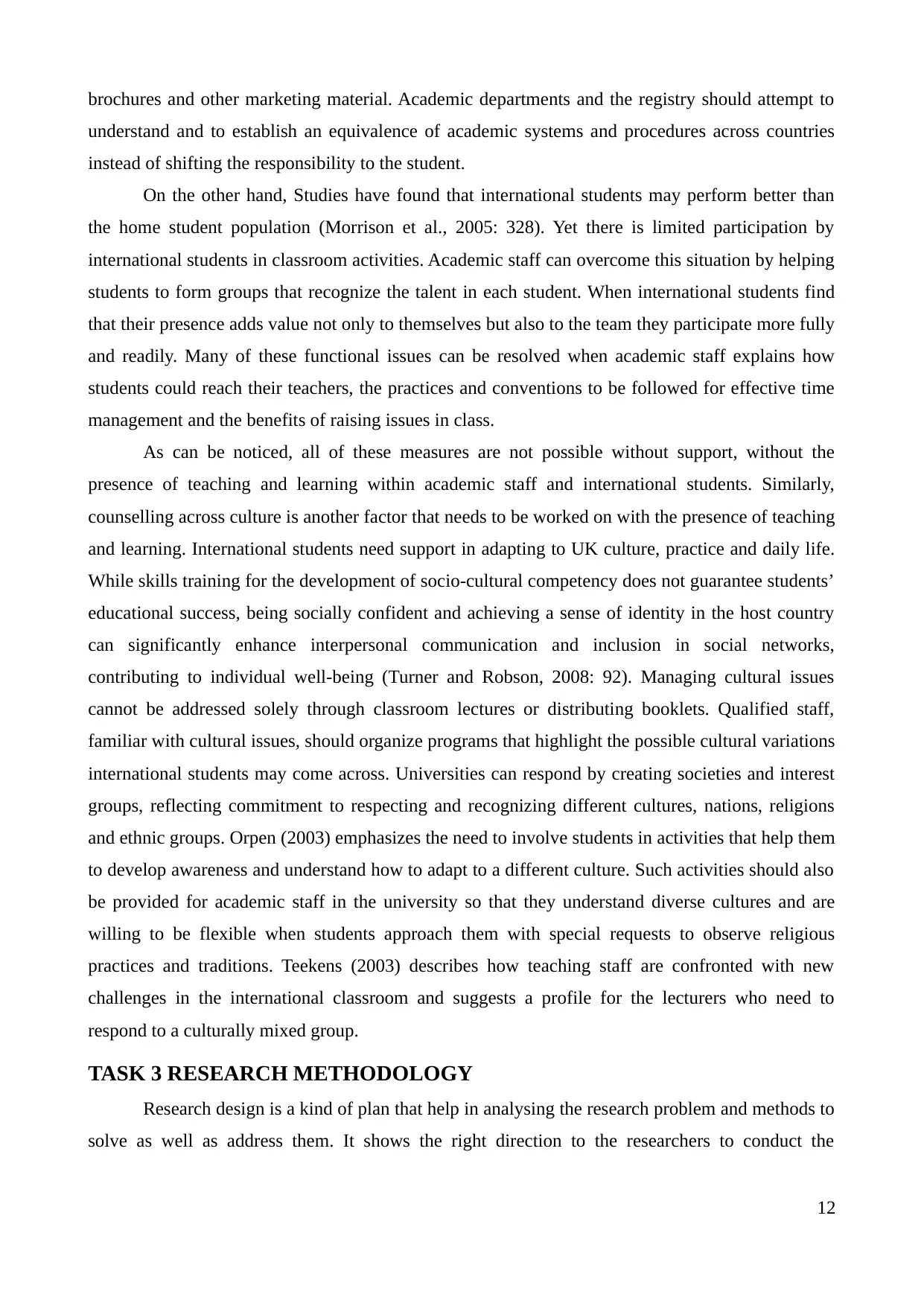
brochures and other marketing material. Academic departments and the registry should attempt to
understand and to establish an equivalence of academic systems and procedures across countries
instead of shifting the responsibility to the student.
On the other hand, Studies have found that international students may perform better than
the home student population (Morrison et al., 2005: 328). Yet there is limited participation by
international students in classroom activities. Academic staff can overcome this situation by helping
students to form groups that recognize the talent in each student. When international students find
that their presence adds value not only to themselves but also to the team they participate more fully
and readily. Many of these functional issues can be resolved when academic staff explains how
students could reach their teachers, the practices and conventions to be followed for effective time
management and the benefits of raising issues in class.
As can be noticed, all of these measures are not possible without support, without the
presence of teaching and learning within academic staff and international students. Similarly,
counselling across culture is another factor that needs to be worked on with the presence of teaching
and learning. International students need support in adapting to UK culture, practice and daily life.
While skills training for the development of socio-cultural competency does not guarantee students’
educational success, being socially confident and achieving a sense of identity in the host country
can significantly enhance interpersonal communication and inclusion in social networks,
contributing to individual well-being (Turner and Robson, 2008: 92). Managing cultural issues
cannot be addressed solely through classroom lectures or distributing booklets. Qualified staff,
familiar with cultural issues, should organize programs that highlight the possible cultural variations
international students may come across. Universities can respond by creating societies and interest
groups, reflecting commitment to respecting and recognizing different cultures, nations, religions
and ethnic groups. Orpen (2003) emphasizes the need to involve students in activities that help them
to develop awareness and understand how to adapt to a different culture. Such activities should also
be provided for academic staff in the university so that they understand diverse cultures and are
willing to be flexible when students approach them with special requests to observe religious
practices and traditions. Teekens (2003) describes how teaching staff are confronted with new
challenges in the international classroom and suggests a profile for the lecturers who need to
respond to a culturally mixed group.
TASK 3 RESEARCH METHODOLOGY
Research design is a kind of plan that help in analysing the research problem and methods to
solve as well as address them. It shows the right direction to the researchers to conduct the
12
understand and to establish an equivalence of academic systems and procedures across countries
instead of shifting the responsibility to the student.
On the other hand, Studies have found that international students may perform better than
the home student population (Morrison et al., 2005: 328). Yet there is limited participation by
international students in classroom activities. Academic staff can overcome this situation by helping
students to form groups that recognize the talent in each student. When international students find
that their presence adds value not only to themselves but also to the team they participate more fully
and readily. Many of these functional issues can be resolved when academic staff explains how
students could reach their teachers, the practices and conventions to be followed for effective time
management and the benefits of raising issues in class.
As can be noticed, all of these measures are not possible without support, without the
presence of teaching and learning within academic staff and international students. Similarly,
counselling across culture is another factor that needs to be worked on with the presence of teaching
and learning. International students need support in adapting to UK culture, practice and daily life.
While skills training for the development of socio-cultural competency does not guarantee students’
educational success, being socially confident and achieving a sense of identity in the host country
can significantly enhance interpersonal communication and inclusion in social networks,
contributing to individual well-being (Turner and Robson, 2008: 92). Managing cultural issues
cannot be addressed solely through classroom lectures or distributing booklets. Qualified staff,
familiar with cultural issues, should organize programs that highlight the possible cultural variations
international students may come across. Universities can respond by creating societies and interest
groups, reflecting commitment to respecting and recognizing different cultures, nations, religions
and ethnic groups. Orpen (2003) emphasizes the need to involve students in activities that help them
to develop awareness and understand how to adapt to a different culture. Such activities should also
be provided for academic staff in the university so that they understand diverse cultures and are
willing to be flexible when students approach them with special requests to observe religious
practices and traditions. Teekens (2003) describes how teaching staff are confronted with new
challenges in the international classroom and suggests a profile for the lecturers who need to
respond to a culturally mixed group.
TASK 3 RESEARCH METHODOLOGY
Research design is a kind of plan that help in analysing the research problem and methods to
solve as well as address them. It shows the right direction to the researchers to conduct the
12
⊘ This is a preview!⊘
Do you want full access?
Subscribe today to unlock all pages.

Trusted by 1+ million students worldwide
1 out of 28
Related Documents
Your All-in-One AI-Powered Toolkit for Academic Success.
+13062052269
info@desklib.com
Available 24*7 on WhatsApp / Email
![[object Object]](/_next/static/media/star-bottom.7253800d.svg)
Unlock your academic potential
Copyright © 2020–2025 A2Z Services. All Rights Reserved. Developed and managed by ZUCOL.





